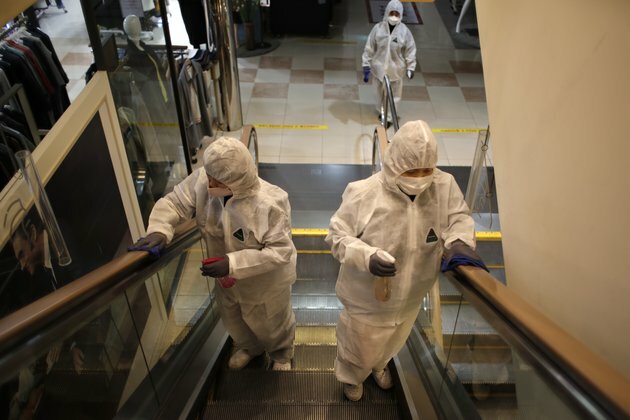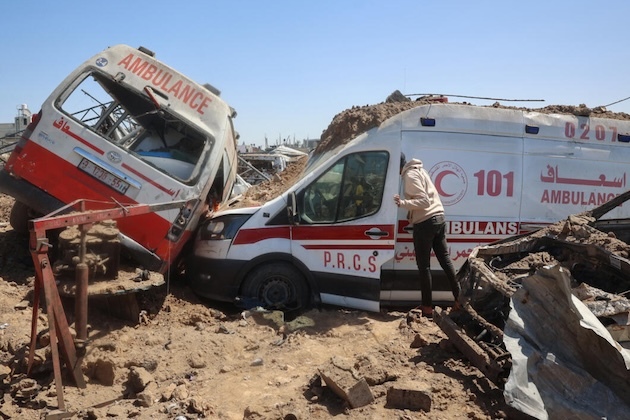South Korea, Britain Aggressively Test for Coronavirus
Voice of America
03 Mar 2020, 05:05 GMT+10

The highly contagious new coronavirus, COVID-19, is testing the capacities of health systems around the world. Several, like those in South Korea and Britain, demonstrate robust diagnostic capability - a critical element of efforts to stop the spread of the pathogen.
How did South Korea increase its testing capacity?
South Korea has the second-largest national caseload of coronavirus, and has tested far more than most nations. As of Monday, South Korea had tested a total of 105,379 people, and 4,212 people were confirmed to have the disease. Some 200 designated health centers across the country can test up to 15,000 people daily.
Newly developed test kits that show results in six hours gained emergency approval by the Korea Ministry of Food and Drug Safety, and were distributed to testing facilities on Feb. 7.
The world's first drive-through testing facilities were also introduced last week, further cutting testing time and minimizing contact between patients and medical workers.
And even more time-saving innovations are in the pipeline. On Monday, South Korean President Moon Jae-in said test kits that show results in just 20 minutes are under review by the Korea Ministry of Food and Drug Safety. He also said more drive-through testing facilities could be built in empty lots and not necessarily in hospitals.
How is Britain's 'random testing' being carried out?
Britain stands out with a very low coronavirus positivity rate of 0.3%. As of Monday, a total of 13,525 people have been tested in Britain, of which 40 were confirmed positive. Public Health England dispatched coronavirus diagnostic test kits to labs across the country on Feb. 10. Since last week, Britain has started mass testing on those who have flu-like symptoms. Eleven hospitals and 100 general medical offices are testing those who are coughing, with a fever and shortness of breath.
How are European and Middle Eastern countries with the worst outbreaks coping?
Italy has the most cases in Europe with 1,694 as of Monday. Italy has carried out more than 23,300 tests. Meanwhile, Iran is preparing for the possibility that "tens of thousands" of people will require testing, according to a spokesman for Iran's Health Ministry. Iran has the world's highest death toll outside of China, with 43. The virus's death rate in Iran is much higher than in other countries, at over 7%. Experts at the World Health Organization are worried Iran may be underreporting the number of cases.
Which country is under fire due to cautious testing?
Japan, for one, is criticized by its media for the low testing numbers. Nihon Keizai pointed out that only 900 tests were conducted on average per day, far fewer than the maximum capacity announced by the Japanese government at 3,800. The Japan Medical Association told a news conference it would investigate reports that people referred by doctors to local health centers for tests were being turned away due to staffing shortages.
How is the U.S. planning to expand testing capacity?
The United States has 75,000 diagnostic kits available at the moment and will expand that number "radically" in coming weeks, U.S. Health and Human Services Secretary Alex Azar told ABC's "This Week" and CBS's "Face the Nation" on Sunday. The U.S. Food and Drug Administration also announced it would allow hundreds of labs to test for the virus. Until now, all test samples were sent to a lab in Atlanta run by the Centers for Disease Control and Prevention. The CDC has conducted fewer than 500 tests, but the decision is expected to improve the pace of detecting the virus.
"We need to come up with a process where private and public health labs, including CDC, work together from the very start of a potential outbreak to get diagnostic testing developed and in the hands of laboratories that can effectively use the technology to test patients," Dr. Melissa Miller told VOA. Miller is director of the Clinical Microbiology Laboratory at The University of North Carolina at Chapel Hill School of Medicine.
How important is testing?
Testing allows for isolating patients and preventing the spread of the virus.
"The coronavirus is spread by droplets," Dr. Eli Perencevich, professor of Internal Medicine and Epidemiology at the University of Iowa Carver College of Medicine, told VOA. "Control of droplet-spread viruses is best done through rapid detection or testing, and isolation of people infected with the organism. In addition, more testing will allow for more rapid, effective contact tracing.
"The cities, states and countries that have adequate testing will be most prepared to detect infected people and those exposed to them, and will have more success in slowing and containing their local outbreaks," Perencevich said.
 Share
Share
 Tweet
Tweet
 Share
Share
 Flip
Flip
 Email
Email
Watch latest videos
Subscribe and Follow
Get a daily dose of North Korea Times news through our daily email, its complimentary and keeps you fully up to date with world and business news as well.
News RELEASES
Publish news of your business, community or sports group, personnel appointments, major event and more by submitting a news release to North Korea Times.
More InformationInternational
SectionWildfires rage in Carolinas as dry winds, downed trees fuel flames
RALEIGH/COLUMBIA: Dry weather, strong winds, and fallen trees from Hurricane Helene have sparked wildfires in North Carolina and South...
Red Cross outraged after killing of Gazan ambulance crews
GENEVA,.Switzerland - The International Federation of Red Cross and Red Crescent Societies (IFRC) has expressed profound outrage following...
Tesla to launch in Saudi Arabia next month after years of tension
RIYADH, Saudi Arabia: Tesla is finally entering Saudi Arabia, with a launch scheduled for next month—marking a significant shift in...
Apple likely to escape EU fine after browser changes
BRUSSELS, Belgium: Apple appears to have dodged a major regulatory setback in Europe, following recent changes to how users select...
FBI probing increased violence against Tesla
WASHINGTON, D.C: FBI Director Kash Patel said this week the bureau was probing what he called the increase in violent activity toward...
Alarm over nine Red Cross personnel going missing in Gaza
GAZA - Israel is refusing to allow search parties to access an area where 9 Red Cross ambulance crew members have gone missing in Gaza....
Business
SectionCoffee prices set to soar as bean costs and supply woes mount
LONDON/NEW YORK CITY: A cup of coffee could soon cost you a lot more. Roasters worldwide are warning of double-digit price hikes as...
U.S. stocks close mixed Monday on eve of trade war escalation
NEW YORK, New York - Industrial stocks advanced while the tech sector was under considerable prressure Monday as Liberation Day, approaches....
Global automakers face disruption as US tariffs set to take effect
BERLIN/DETROIT: Automakers worldwide are bracing for the impact of sweeping new U.S. tariffs that could reshape global vehicle production...
Dollar Tree sells Family Dollar in $1 billion exit deal
CHARLOTTE, North Carolina: Dollar Tree is cutting ties with its struggling Family Dollar chain in a US$1 billion deal that marks the...
BYD aims to double overseas EV sales to 800,000 in 2025
SHANGHAI, China: As global demand for electric vehicles continues to rise, China's BYD is looking to double its overseas sales to over...
To meet US AI energy surge, Schneider Electric invests $700 million
ANDOVER, Massachusetts: As artificial intelligence drives up energy demand across the United States, Schneider Electric is making a...













